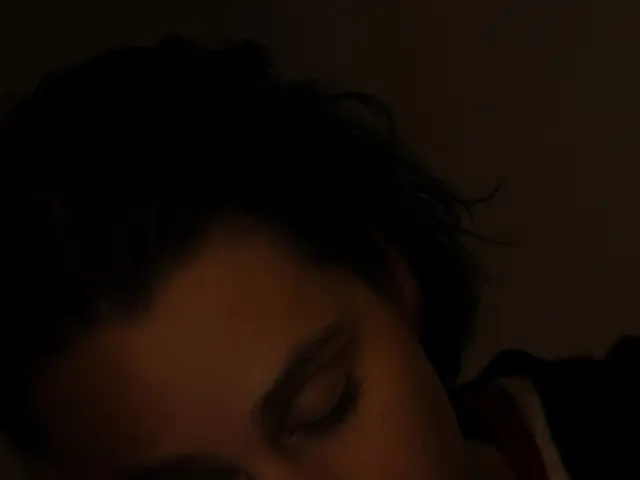Overcoming Afternoon Drowsiness: Practical Strategies for Staying Awake
Afternoon snoozes got you feeling drained and unproductive? Here's what's going on and how to power through!
We'll dive into the causes of that midday slump you've been experiencing, and provide tips to manage and conquer this issue once and for all. From the impact of your circadian rhythm on your energy levels to sleep debt and more, let's break it down.
Decoding Your Afternoon Slump
To understand that tiredness creeping up on you in the afternoon, it's essential to recognize the reasons behind it and the effects it has.
One key culprit of the afternoon slump is the inevitable dip in your energy levels within your circadian rhythm. Your circadian rhythm, responsible for controlling your sleep-wake cycle, causes this natural decline to occur. This dip is often known as the "afternoon slump."
Chronic daytime sleepiness could stem from sleep disorders such as sleep apnea or insomnia, so if this sounds familiar, it may be worth exploring further.
Another major contributor? Not getting enough Zzz's. When you don't catch enough shut-eye at night, you're bound to feel sluggish the following day.
Common Causes of Your Afternoon Sluggishness
Wondering why you're suddenly feeling so beat during the day? Here are three reasons behind that afternoon grogginess:
- Sleep issues: Poor sleep quality, insufficient sleep duration, or various sleep disorders can all lead to the afternoon slump. Issues like insomnia, sleep apnea, or restless leg syndrome can disrupt your sleep patterns and leave you exhausted during the day.
- Circadian rhythm dip: The natural circadian rhythm dip is worsened by sleep debt or lack of restful sleep, causing you to feel even more drained.
- Post-lunch energy crash: A meal full of heavy carbohydrates can cause an energy crash after lunch, leading to a dip in your alertness.
How Circadian Rhythm Impacts Your Energy Levels
Ever wondered how your circadian rhythm affects your afternoon slump? Here's everything you need to know:
Your circadian rhythm is a natural, internal process that determines your sleep-wake cycle. It controls the fluctuations in your energy levels throughout the day.
During the afternoon, most people naturally experience a dip in energy levels, a common symptom known as the "energy slump." This is a normal response to your circadian rhythm.
In some cases, this afternoon slump can be more persistent, indicating a potential circadian rhythm disorder or underlying issue.
The Role of Sleep Debt in Your Afternoon Slump
Sleep debt—the accumulation of lost sleep over time—can worsen your afternoon slump. Here's how:
- Added tiredness: Your body's ('physiological') need for sleep remains constant, regardless of how much you rest. When you don't get enough sleep, a sleep debt is created, which can translate to increased tiredness during the day.
- Reduced productivity: Your cognitive functions, including memory, attention, and decision-making abilities, are negatively impacted by sleep debt, making it hard to maintain productivity and efficiency in the afternoon.
- Mood changes: You may experience irritability, moodiness, and increased stress with sleep debt, making it even more challenging to tackle that afternoon slump.
Strategies to Smash Your Afternoon Energy Dip
To tackle that afternoon sleepiness, try these tips to boost your energy and stay alert:
- Adequate sleep: Prioritize getting 7 to 9 hours of sleep at night to ensure your body receives the sleep it needs.
- Establish a schedule: Follow a consistent sleep routine and create a comfortable sleep environment to support quality sleep.
- Keep it moving: Engage in regular physical activity, even quick exercise sessions like walking or stretching, to avoid fatigue and maintain focus.
- Stay hydrated: Drink plenty of water throughout the day to keep your energy levels and overall well-being in check.
- Snack smarter: Opt for low-sugar, high-fiber foods for sustained energy instead of sugary snacks that can lead to energy crashes.
- Soak up the sun: Exposure to natural daylight can help combat afternoon sleepiness, so take a midday stroll if possible!
Lifestyle Habits to Fight Afternoon Fatigue
Tackle your afternoon tiredness with these easy-to-implement lifestyle habits:
- Get moving: Regular physical activity increases energy levels and combats afternoon lethargy.
- Stay hydrated: Keep a water bottle nearby and sip throughout the day to stay energized and hydrated.
- Eat well: Fuel your body with nourishing foods to prevent energy dips, opting for a balanced diet with whole grains, lean proteins, fruits, and vegetables.
If your afternoon sleepiness persists and interferes with daily activities, don't hesitate to seek medical advice. A healthcare professional can help identify underlying health conditions or recommend the best course of action to alleviate your symptoms and improve your overall well-being.
- The afternoon slump could be attributed to a dip in your circadian rhythm, a natural decline in energy levels that occurs due to your internal sleep-wake cycle.
- Neglecting good sleep hygiene, such as poor sleep quality or insufficient sleep duration, may lead to sleep disorders like insomnia, sleep apnea, or restless leg syndrome, contributing to your afternoon sluggishness.
- Circadian rhythm disorders may exacerbate the natural dip in energy levels during the afternoon, causing persistent tiredness.
- A heavy, carbohydrate-rich lunch can trigger an energy crash afternoons, further aggravating feelings of lethargy.
- Addressing sleep debt by prioritizing 7-9 hours of sleep at night, establishing a consistent sleep schedule, and maintaining a healthy lifestyle (including physical activity and balanced nutrition) can help combat the afternoon energy dip and foster overall health-and-wellness, fitness-and-exercise, and mental-health.








